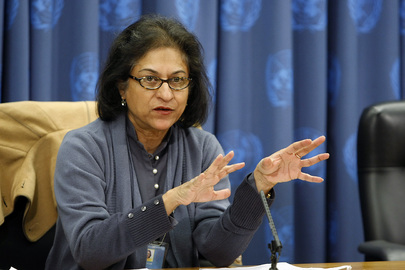
Die Unterdrückung von Frauen ist nach wie vor der am weitesten verbreitete Ausdruck von Intoleranz und Extremismus. Darauf wies gestern die UN-Sonderberichterstatterin für das Recht auf Religions- und Glaubensfreiheit, Asma Jahangir, während einer Aussprache im Dritten Ausschuss der Vereinten Nationen in New York hin, wie die Vereinten Nationen hier berichten.
“There are countries that simply will punish women if they do not wear a headscarf and there are other countries where women, if she wears a headscarf, will be penalized or sanctioned … It has to be balanced“
Frau Jahangir betonte die Notwendigkeit von interreligiösem Dialog und Bildung für den Abbau religiöser Intoleranz.
„The capacity of a Government to deal with such matters as incitement in a way that was fair and reduced tensions between groups was directly linked to the existence of an independent judiciary … She warned that, in the whole area of religious criticism and incitement, States must be wary of over-legislation, including the adoption of blasphemy laws, saying that education and dialogue among religious leaders and youth of different faiths was more effective at reducing religious tensions than such laws. In fact … using legislation too heavily could increase tensions.“
Die Anhörung der UN-Sonderberichterstatterin im Ausschuss der Generalversammlung der Vereinten Nationen, der soziale, humanitäre und kulturelle Belange verhandelt, stand in einer Reihe weiterer Anhörungen, worüber die Vereinten Nationen hier berichten.
In der allgemeinen Debatte des Dritten Ausschusses äußerte sich der schwedische UN-Botschafter Per Orneus auch zur Menschenrechtslage im Iran. Schweden hat derzeit die EU-Ratspräsidentschaft inne.
„With regard to Iran, the European Union condemned the violence following the June elections, and was troubled by the high number of arrests, particularly of human rights defenders and political activists. It was also troubled about the possible use of torture and excessive use of force by authorities and militia members. It was deeply concerned by information, officially confirmed, that three individuals were sentenced to death after post-electoral mass trials. It was further troubled by other serious human rights violations in the country, such as the high number of executions and continued occurrence of the execution of minors. Some prisoners were being held for exercising their right to freedom of expression, and the European Union called for the release of all political prisoners. The situation of Baha’i persons and other religious minorities remained serious. He called on the Iranian Government to uphold the international obligation to safeguard religious freedom.“
